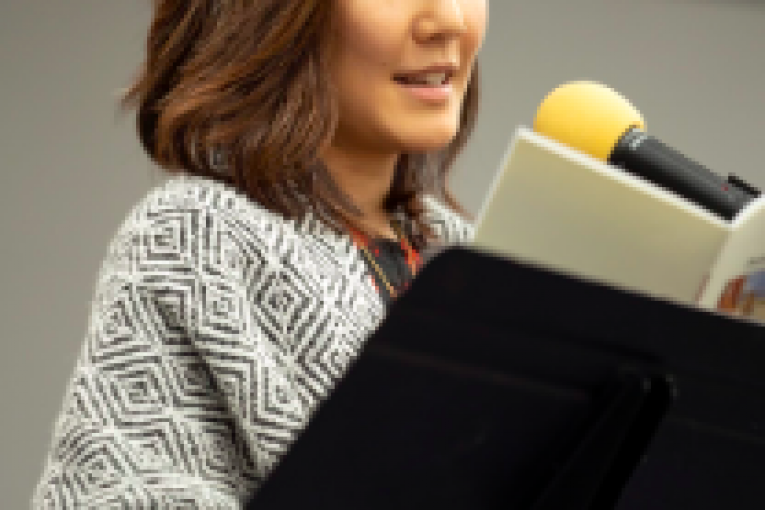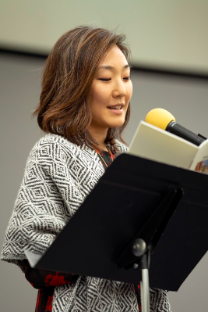

By Ghostwrite Mike & The Mundo Press
CHOWCHILLA, CA – Most people don’t realize that carceral state residents in California can pursue Associate, Bachelor’s and Master’s degrees via a myriad of taxpayer-funded programs involving proctored correspondence courses, Wi-Fi-enabled laptops and in-person classes with traveling professors.
We were invited to attend a poetry workshop facilitated by Brynn Saito, a published poet and MFA-society professor who teaches English at California State University, Fresno, who recently visited Valley State Prison’s (VSP) first cohort of BA degree-seeking students graduating at the end of Spring Semester.
“It was an honor to spend time with the students at VSP,” Saito said following her visit.
Saito was invited by CSU-Fresno English professor Jesse Scaccia, who teaches in-person at VSP. Scaccia convened the poetry workshop and opened his classroom to all of VSP’s interested college students, including those not enrolled in the BA program.
There wasn’t a vacant seat in the class. Saito described the experience as “engaging,” emphasizing the contributions made by workshop attendees who wrote and read original free-write works.
“Each poem they shared showed me the depth of wisdom, pain, and desire present in that room—and everyone shared, which, from a teacher’s point of view, was simply wonderful,” Saito said.
Goon, an alum of the Inside Out Writers poetry program and facilitator of the Barz Behind Bars (B³) poetry workshop, appreciated being included despite his non-student status.
“Jesse was great for including us and Brynn was really special in the way she created a normalizing environment using poetry. She treated us like we weren’t locked up, was vulnerable herself, and that really moved a lot of us. Brynn has a very nurturing and affirming presence in the room that makes you want to dig deeper. It was refreshing,” Goon said.
Using published works by Saito and other poets to prompt critical reading exercises, the program included personal portrayals of Saito’s own familial experiences.
“One highlight for me was being able to share my own poetry—poems written about my family’s experiences in the camps during the WWII-era incarceration of the Japanese American community. I’ve never had the opportunity to read those poems to an audience in a prison setting,” Saito noted.
One of the poems, though over a decade old, instigated participant insight Saito said she’d not heard before from free-world students, remarking that “the feedback, critiques and empathy I received from the men in the workshop helped me see the poems in a whole new light. I’m grateful for that.”
Rarely do incarcerated folks agree on anything, but the walk back to the yard following Saito’s workshop was peppered with enthusiasm, laughter and consensus about the need for more encounters like this.
In the workshop, Saito described the poet and reader as “conjurors,” collaboratively cultivating meaning in those open spaces poets purposely leave hollow, as if intending for all of us to seek a subjective thesis therein.
Poetry really is that one art form that we think most pointedly prompts one’s empathetic reasonability, because in order to extract the poet’s voice from the page, one has to selflessly try to become one with meaning. There’s a profound lesson in that praxis.
Poetry has proven to be a community-building ingredient, particularly in carceral settings where social dictates can often prevent candid disclosures of vulnerability, fear or shame. A sort of second cousin to rap, poetry can stand in the cultural gap and give men a familiar place to vent, be it with the simplicity of a nursery rhyme, or a simple soliloquy about loss.
When it comes to trauma, poetry can serve as a vessel or conduit that accepts all manner of confessionals. We were glad to have found it within a college classroom being convened within a prison.
Having witnessed firsthand the redemptive power of poems being crafted and read by men serving life terms, we believe that wherever there is poetry, a special kind of societal medicine is present.
Perhaps if poetry can be harnessed smartly to present informative and engaging carceral perspectives that resonate not just with the free world public, but also those surviving our nation’s mass incarceration status quo, a new format of audio podcasting content might emerge from within the carceral state that conjures a new kind of conversation about transformation?

